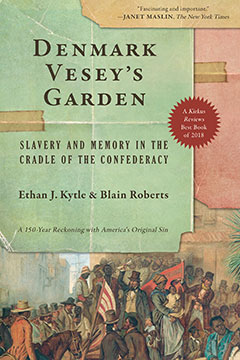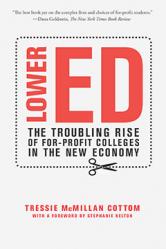“Ethan Kytle and Blain Roberts remind us that the cost of whitewashing the history of racial enslavement and its legacies continues to be too great a burden to bear for American democracy. For any reader interested in current political debates over Civil War memory and monuments, this book is a must-read.”—Manisha Sinha, Frederick Douglass Book Prize–winning author of The Slave’s Cause: A History of Abolition |
“Nuanced, beautifully written, and well researched, Denmark Vesey’s Garden will interest specialized scholars, graduate and undergraduate students, and ordinary readers who want to understand how the slave past shapes debates on race in the United States. For scholars working on the memory of slavery in other parts of the Atlantic world, this book provides a landmark to develop comparative studies and is also a rich model to be followed.”—Ana Lucia Araujo, The American Historical Review |
“Denmark Vesey’s Garden: Slavery and Memory in the Cradle of the Confederacy is vital to understanding some of the deepest fault lines in American life. . . . An excellent history of the divergent views of slavery.”—Shelf Awareness |
“Kytle and Roberts’ combination of encyclopedic knowledge of Charleston’s history and empathy with its inhabitants’ past and present struggle make them ideal guides to this troubled history.”—Publishers Weekly (starred review) |
“A timely look at America’s contested past. . . . Strongly recommended for anyone interested in or hoping to understand more about southern history, especially the ongoing debate over the representation of slavery and the Confederacy.”—Library Journal |
“A stunning contribution to the historiography of Civil War memory studies [that links] the memories and actions of black and white Charlestonians over the years to the present-day ideas motivating extremists like Dylann Roof. . . . This book speaks to the present as eloquently as it narrates the past.”—Civil War Times |
“Those who dismiss contemporary opposition to the Calhoun Monument as misplaced ‘political correctness’ need to read Denmark Vesey’s Garden, which shows the deep provenance of black Charlestonian’s opposition to both Calhoun the man and the symbol.”—The Post and Courier (Charleston) |
“A rigorous and timely study.”—Black Perspectives |
“Nothing has shaped this nation more than slavery and its legacy. Kytle and Roberts’s meticulous research, compelling writing, and thoughtful analysis are vital to our nation at a time when we are haunted by a history we need to understand more deeply.”—Bryan Stevenson, New York Times bestselling author of Just Mercy: A Story of Justice and Redemption |
|
“Denmark Vesey’s Garden will have enormous implications for the entire country.”—Douglas Egerton, author of Year of Meteors, Thunder at the Gates, and The Wars of Reconstruction |
“A fascinating and important new historical study.”—Janet Maslin, The New York Times |
“Eye-opening history . . . an important and fascinating examination of American slavery’s aftermath.”—Kirkus Reviews (starred review) |
“The authors do an excellent job of tracing and exploring those competing visions [of slavery]. . . . Those who read it will not just learn how the institution has been remembered but also wrestle with the ramification of America’s slave past for its present and future.”—Civil War Book Review |
“A timely, well-researched, and deftly argued intervention with both scholarly and public importance.”—Tropics of Meta |
“Readers are drawn into a community where the shadows of slavery are ever-present and white and black Charlestonians jockey for influence over whether and how those shadows are acknowledged.”—Fitzhugh Brundage, William B. Umstead Distinguished Professor, University of North Carolina |
“Kytle and Roberts’s engaging style will remind readers of Edward Ball’s work, Slaves in the Family, providing a new window onto the Charleston past and delivering an important message for the present.”—Catherine Clinton, Denman Chair of American History, University of Texas, San Antonio, and president, Southern Historical Association |
“Denmark Vesey’s Garden uses the small place of Charleston, South Carolina, to tell a large tale, what we remember of history and what we prefer to forget. It is a fascinating and unflinching performance, showing that all of American history can inhabit a few greying square miles.”—Edward Ball, National Book Award–winning author of Slaves in the Family |
“Denmark Vesey’s Garden reveals that the long struggle over how Americans remember slavery has been inseparable from the long struggle for racial justice.”—Ibram X. Kendi, National Book Award–winning author of Stamped from the Beginning: The Definitive History of Racist Ideas in America |
|







